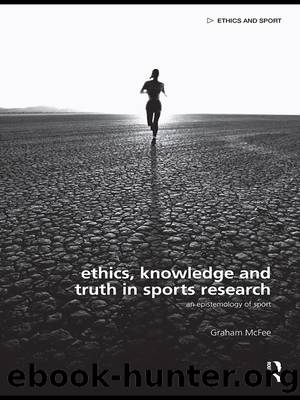Ethics, Knowledge and Truth in Sports Research by McFee Graham;McNamee Mike J.;Parry Jim;Reid Heather;

Author:McFee, Graham;McNamee, Mike J.;Parry, Jim;Reid, Heather;
Language: eng
Format: epub
Tags: Humanities
Publisher: Taylor & Francis Group
Published: 2009-12-11T00:00:00+00:00
Perspectivalism without paradigms
So we need an alternative conceptualization to the scientistic one sketched earlier of what it is for some (research) claim to be true. For that scientistic conception imagines that truth-claims are always independent of researchers, but this cannot be correct, if weight must be given to how the event should be conceptualized. Here, it is crucial, first, that we see events from our own perspective, both literally and metaphorically. For we only know some things â although we grant that others, if known, would be relevant. Second, such perspectivalism is an inevitable consequence of our human limitations in space and time: again (from chapter 5), â[t]he view each of us has of the events through which we have lived is inevitably incomplete .. .â (Toulmin, 2001: 7). Our âtakeâ on events is partial: you may stress events of which I was unaware. But these facts, had I known them, might have altered my judgement. So my account is incomplete. Then, third, sometimes these facts could be pointed out to me. Thus approaching the truth might seem to require adding your perspective to mine, and so on, thereby removing this âincompletenessâ. But this is a mistaken understanding of the nature of the incompleteness. It is typically not remediable by the addition of other perspectives, because we have no reason to think either that the perspectives are mutually consistent (and so on) or that there is some finite totality of such perspectives, if only it could be reached. Yet only then would one have a complete account by having all the perspectives on the events, another misplaced commitment to a finite totality. Since this is impossible, it is not really incompleteness at all. As such, it cannot amount to a methodological flaw: as Toulmin (2001: 7) puts it, research is not â⦠slantedâ.
We saw in chapter 4 that the relevant conception of truth is one which is objective, humanly speaking. Only such human-sized truths can be explanatory of social events, such as sporting ones. Such truth will be contrasted with my wishing or wanting â the truth will be independent of my desire for such-and-such to be true; and, unlike opinion, truth will have an evidence-base. So we have recognized the epistemological consequences: only social truth, human truth, would be useful here.
But what are the other characteristics of this conception of truth in social matters? Well, truth is reliable â not self-indulgent in ways rejected earlier. Further, whether or not some claim here is true, as opposed to false, will be arguable â using respectable methods, and such like. That is one reason why, when investigating sport (as when pursuing other truths in the social realm), we draw on the concepts and techniques of academic disciplines. For they represent standard ways to understand both what questions to ask, and what methods to use to resolve (or answer) those questions. As Tomlinson (1997: 262) grants, â[i]n the messy world of social science research at least, the integrity of the project should be at the forefront of the researcherâs considerationâ.
Download
This site does not store any files on its server. We only index and link to content provided by other sites. Please contact the content providers to delete copyright contents if any and email us, we'll remove relevant links or contents immediately.
The Art of Coaching Workbook by Elena Aguilar(50168)
Trainspotting by Irvine Welsh(21078)
Twilight of the Idols With the Antichrist and Ecce Homo by Friedrich Nietzsche(18324)
The Secret History by Donna Tartt(18268)
All the Missing Girls by Megan Miranda(14858)
Cat's cradle by Kurt Vonnegut(14804)
Ready Player One by Cline Ernest(14062)
Talking to Strangers by Malcolm Gladwell(12916)
Fangirl by Rainbow Rowell(8819)
The Compound Effect by Darren Hardy(8544)
Thirteen Reasons Why by Jay Asher(8492)
The remains of the day by Kazuo Ishiguro(8433)
Periodization Training for Sports by Tudor Bompa(7947)
Tools of Titans by Timothy Ferriss(7850)
Wonder by R. J. Palacio(7756)
The Lover by Duras Marguerite(7605)
Change Your Questions, Change Your Life by Marilee Adams(7405)
A Court of Wings and Ruin by Sarah J. Maas(7307)
The Complete Stick Figure Physics Tutorials by Allen Sarah(7162)
